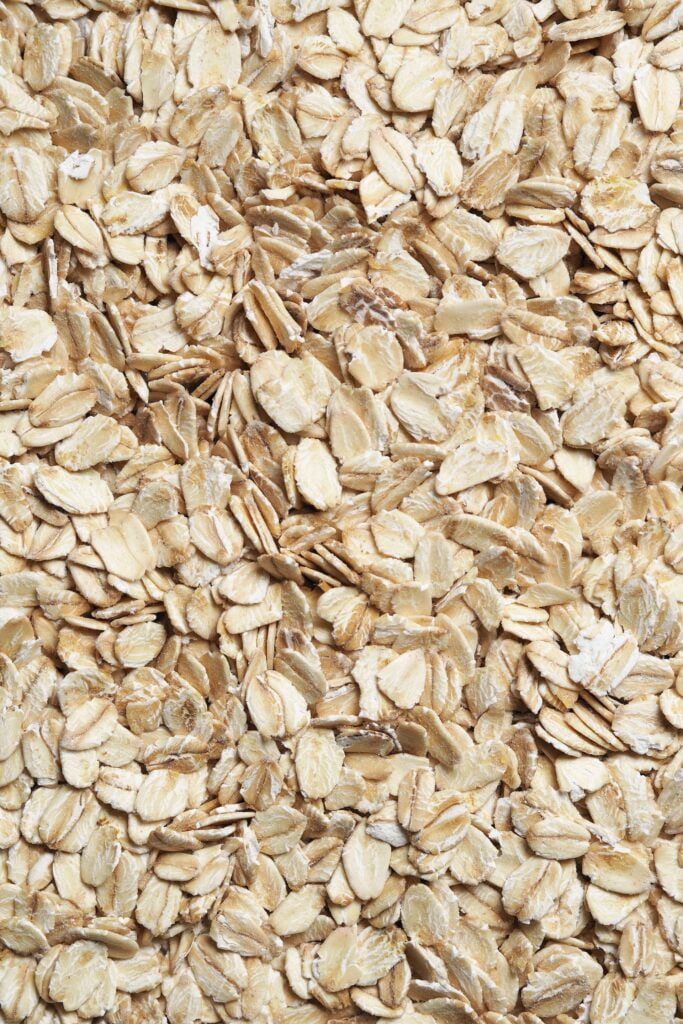A person’s protein requirements depend on several categories, including age, sex, weight and physical activity.
The recommended daily allowance of protein for an adult male is around 55 grams and for females 45 grams.
A person who is active or who wants to build muscle may require more protein per day.
Disadvantages of having too much protein are – intestinal discomfort, nausea, irritation, diarrhoea, kidney failure, headache etc.
Oats

They are rich in complex carbs and a wide range of vitamins and minerals.
Oats are an excellent source of fibres particularly beta-glucans, which are linked to many health benefits like lower cholesterol levels and blood sugar control.
Oats contain more protein compared to other grains. 100 grams of Raw oats contain about 13 grams of protein. They provide essential amino acids that support muscle growth and repair.
However, it is advised to soak them before consuming them for easier digestion
Quinoa
Quinoa has a great nutritional profile. They contain complete protein, making them an excellent choice for vegans. Quinoa are high in fiber which helps in digestion.
100 grams of cooked quinoa contains about 4 grams of protein.
Apart from protein and fibre, they do contain minerals like magnesium and iron.
Seitan

Seitan is referred to as wheat meat as it is made from wheat gluten. As this has a meaty texture and is high in protein, vegans prefer it more often.
100 grams of seitan contains about 11 grams of protein.
People who are intolerant to gluten should be cautious while having seitan in their diet as they are high in gluten.
Broccoli

Broccoli comes from a cruciferous family. They contain a high load of vitamins C and K. It is high in dietary fibre for digestive health. Broccoli contains sulforaphane, an antioxidant known for cancer-fighting properties. You can best enjoy broccoli in salads as it adds both flavour and nutrition.
100 grams of raw broccoli contains about 3 grams of protein.
Mushrooms
They are low in calories with essential nutrients like vitamin B, selenium and potassium. Mushrooms come in many shapes and sizes, studies have shown that mushrooms help in supporting the immune system.
When it comes to protein content, 100 grams of cooked mushrooms contain about 4 grams of protein.
Lentils
Lentils are a nutritional powerhouse, they are an excellent source of plant-based protein, making them a great choice for vegetarians and vegans. They contain a high amount of fibre, which aids in digestive health and helps stabilize blood sugar levels.
When it comes to protein content, 100 grams of boiled lentils contain about 9 grams of protein.
Peanuts
They are crunchy and very nutritious snacks. Peanuts contain heart-healthy monounsaturated fats, and many vitamins and minerals.
Peanuts are also very high in protein content. They contain about 25 grams of protein per 100 grams.
Soybeans
Soybeans are a complete source of plant-based protein. They provide all the essential amino acids we need. Soybeans are rich in healthy fats, fibre, vitamins and minerals.
100 grams of cooked soybeans contain about 17 grams of protein.
Chia seeds

These small-looking seeds are packed with many nutritional benefits. They are rich in omega-3 fatty acids, protein and fibre. Chia seeds are rich in minerals like calcium, magnesium and phosphorus. They are very helpful in supporting bone health.
When it comes to protein content, 100 grams of chia seeds contain about 18 grams of protein in them.
Almonds
They are crunchy and highly nutritious. Almonds are packed with heart-healthy fats, protein and fibre. They are a rich source of vitamin E, which supports skin health and boosts immunity. Magnesium and calcium in almonds support bone and muscle health.
100 grams of raw almonds contain 20 grams of protein, making them one of the richest vegan sources of protein.
Hemp seeds
Hemp seeds are very rich in protein and provide all essential amino acids for muscle and tissue repair. They are packed with omega-3 and omega-6 fatty acids thus promoting cardiovascular health. Apart from these, they contain minerals like magnesium and iron.
100 grams of hemp seeds contain about 30 grams of protein.
For more articles like this, check out our physical health section.

